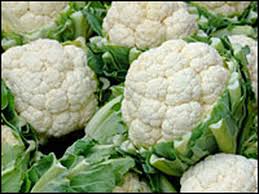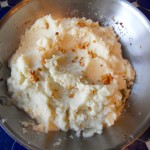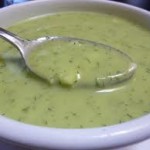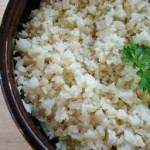Cauliflower Instead of Potatoes or Rice
Recipe Key
 This is the time of year the farmers markets are blooming with cauliflower. There are many reasons to eat lots of cauliflower. Cauliflower is a member of the cancer prevention cruciferous family of vegetables. Cauliflower is anti-inflammatory and alkaline which reduces the acids that naturally build up in your system. It is also full of antioxidants to support your heart and brain.
This is the time of year the farmers markets are blooming with cauliflower. There are many reasons to eat lots of cauliflower. Cauliflower is a member of the cancer prevention cruciferous family of vegetables. Cauliflower is anti-inflammatory and alkaline which reduces the acids that naturally build up in your system. It is also full of antioxidants to support your heart and brain.
Cauliflower Instead of Potatoes
Cauliflower is replacing the potato for many people. The reason is, although potatoes are a whole plant food they have a higher glycemic index (90) than sugar (59). They cause our blood sugar levels to rapidly rise, which causes our blood insulin to increase as well. When these two metabolic processes occur repeatedly we become insulin resistant. The insulin then gets stored as fat, usually belly fat. Eating potatoes occasionally will not impact your overall health but eating them regularly is not the best choice.
Cauliflower makes a delicious potato replacement for people like me who want to eat a lower glycemic diet to support my health. Keeping my fasting blood sugar at 85 is one of my biggest health challenges. Therefore I choose cauliflower over potatoes. When steamed and pureed cauliflower turns silky and velvety just like mashed potatoes. Adding grass fed butter helps too! Here are a few recipes:
Cauliflower Mashed “Potatoes” with Golden Garlic – This is my favorite way to eat cauliflower.
Creamy Cauliflower Soup with Dill – Cauliflower can be used in blended soups to create the white, creamy texture of potatoes.
Cauliflower Instead of Rice
When it comes to replacing white rice, cauliflower has a bland flavor like rice that won’t overpower a dish. It provides a similar structure and look for faux rice. Here are two recipes I love
Cauliflower Rice – This is a great stand in for rice. While it doesn’t taste exactly like rice, the look and texture is close. It has a delicious savory taste.
Raw Nori Rolls – Instead of sushi rice I make this dish with a raw cauliflower rice. When wrapped up in the nori roll it looks and taste just like regular sushi rice.
Other Ways to Use Cauliflower
Paleo Cauliflower (no bean) Hummus – I love bean free hummus with vegetable sticks
Cauliflower Wraps – A grain free alternative to regular wraps
Cauliflower Fritters – These can be eaten for breakfast, lunch or dinner
Roasted Cauliflower with Turmeric – Roasting Cauliflower with coconut oil and spices concentrates the flavor
Blackened Cauliflower Steaks – Slicing the cauliflower into “steaks” and adding the same spices as Blackened Tuna makes a great vegetarian entrée.
Cauliflower is a powerful superfood and my newsletter would not be complete without sharing the health benefits.
Health Benefits of Cauliflower
High in Vitamins and Minerals
One serving of cauliflower contains 77 percent of the recommended daily value of vitamin C. The stems are higher in this vitamin then the florets. Use as much of the stems as possible. Cauliflower contains several B vitamins (vitamins we might miss if we are grain free) including folate. These vitamins are good for your liver and brain. It’s also a good source of vitamin K, protein, thiamin, riboflavin, niacin, magnesium, phosphorus, fiber, pantothenic acid, potassium, and manganese.
Detoxification
Cauliflower contains sulfur-containing nutrients and antioxidants to support both phase 1 and phase 2 detox activities. The glucosinolates in cauliflower also activate detoxification enzymes. It is interesting to note cauliflower contains only about 60% as much glucosinolates as broccoli and about 70% as much as kale.
Cancer Prevention
There re are dozens of studies linking cauliflower-containing diets to cancer prevention. Cauliflower contains sulforaphane, a sulfur compound that has also been shown to kill cancer stem cells, thereby slowing tumor growth. Research has shown combining turmeric with cauliflower may prevent and treat prostate cancer.
Anti-Inflammatory
We need some inflammation in our body to stay healthy. Problems occur when it get out of hand and we have chronic inflammation. The omega-3 fatty acids and vitamin K in cauliflower helps to prevent chronic inflammation that leads to conditions such as arthritis, chronic pain, and inflammatory bowl conditions. Cauliflower also contains anti-inflammatory nutrients, including indole-3-carbinol or I3C, that may operate at the genetic level to help prevent the inflammatory responses at its foundational level.
Digestive Support
Cauliflower has a significant amount of soluble fiber making it beneficial for cleaning out your digestive system of unnecessary waste. Additionally, a substance called glucoraphin present in cauliflower appears to have a protective effect on your stomach lining. The fiber in cauliflower is also beneficial for managing blood sugar and cholesterol levels.
Aging Gracefully
The high level of antioxidants and photonutrients will help protect you from free radical damage and reduce your risk of oxidative stress, which accelerates the aging process from tissue and organ damage. It helps to keep you from getting “rusty” (oxidation).
Heart Health
By decreasing chronic inflammation, cauliflower is able to prevent obstructions in the blood vessels and keep excellent blood flow to essential organs of the body.







One Comment